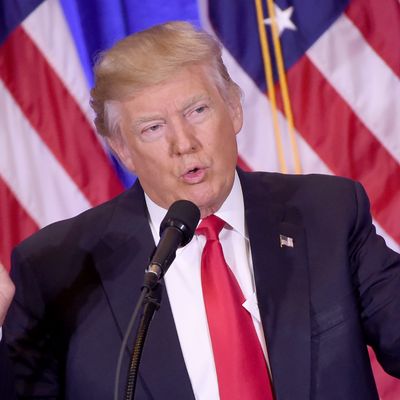
If you’ve just acknowledged that Russia hacked your political opponent and you’re embroiled in a scandal over unverified claims that you’ve been compromised by Moscow, publicly signaling your openness to Russia and its policy goals is not the logical next move. But, for whatever reason, that’s how Donald Trump chose to spend his weekend — when he wasn’t lashing out at a civil-rights icon and a sketch-comedy TV show.
On Friday, Trump told The Wall Street Journal that he’ll keep the sanctions the U.S. imposed against Russia over its alleged election cyberattacks and annexation of Crimea “at least for a period of time.” However, he said he’s open to lifting them if Russia helps achieve U.S. goals, like fighting terrorism.
“If you get along and if Russia is really helping us, why would anybody have sanctions if somebody’s doing some really great things?” he said.
The president-elect expanded on that point in an interview given jointly to The Times of London and the German newspaper Bild, which was published on Sunday.
“They have sanctions on Russia — let’s see if we can make some good deals with Russia,” he said. “For one thing, I think nuclear weapons should be way down and reduced very substantially, that’s part of it. Russia’s hurting very badly right now because of sanctions, but I think something can happen that a lot of people are going to benefit.”
Trump criticized Russian president Vladimir Putin’s actions in Syria, calling it “a very bad thing” that led to a “terrible humanitarian situation.” He did not draw much of a distinction between Putin and German chancellor Angela Merkel, leader of one of the United States’ closest allies. “Well, I start off trusting both — but let’s see how long that lasts,” he said. “It may not last long at all.”
Merkel is up for reelection in the fall, and she’s facing a challenge from the anti-immigrant Alternative für Deutschland. According to Bloomberg, Trump told Bild he respects Merkel, but couldn’t say whether he wants to see her reelected because he doesn’t know her. He also claimed she’s hurt Germany by accepting more than 1 million refugees — or “all of these illegals” — into the country.
“I think she made one very catastrophic mistake and that was taking all of these illegals, you know, taking all of the people from wherever they come from,” he said. “And nobody even knows where they come from. So I think she made a catastrophic mistake, very bad mistake.”
Trump went on to predict more countries will follow Britain’s lead and exit the European Union. “People, countries want their own identity and the U.K. wanted its own identity,” he said, adding that he wants to secure a trade agreement between Britain and the U.S. “very quickly.”
While Trump claimed that NATO is “very important” to him, he reiterated his complaints about other countries not “paying their fair share.” “I said a long time ago that NATO had problems. Number one it was obsolete, because it was designed many, many years ago,” Trump said. “Number two the countries aren’t paying what they’re supposed to pay. I took such heat, when I said NATO was obsolete. It’s obsolete because it wasn’t taking care of terror. I took a lot of heat for two days. And then they started saying Trump is right.”
Whatever “they” Trump is referring to does not include his own pick to lead the Defense department. During his confirmation hearing last week, retired general James Mattis told Congress that Putin wants to “break the North Atlantic alliance,” and that this is one of an increasing number of areas where the U.S. must confront Russia. “If we did not have NATO today, we would need to create it,” Mattis said.
NATO experts also challenged Trump’s suggestion that NATO isn’t combating terrorism. “After 9/11, NATO’s main vocation became fighting terrorism in Afghanistan,” Alexander Vershbow, the former deputy secretary general of NATO, told the New York Times. “It is now heavily engaged in training the militaries of many Middle Eastern countries to help them fight terrorism in their own backyard.”
Trump expressed similar foreign-policy statements many times on the campaign trail, but the Times reported that there’s increased alarm in Europe as leaders have come to realize that his “acerbic criticism of NATO and the European Union was not just an attempt to win votes.”
Earlier in the day, outgoing CIA director John Brennan criticized Trump’s command of foreign policy. “I don’t think he has a full understanding of Russian capabilities and the actions they are taking on the world,” Brennan told Fox News Sunday.
“Now that he’s going to have an opportunity to do something for our national security as opposed to talking and tweeting, he’s going to have tremendous responsibility to make sure that U.S. and national security interests are protected,” Brennan added, noting that the president-elect’s impulsive tweets could be dangerous. “Spontaneity is not something that protects national security interests.”
Trump tweeted his rebuttal on Sunday night, suggesting that Brennan might have leaked the dossier containing allegations about his ties to Russia to the press (though we know the document’s origin and it’s been circulating among journalists and politicians for months).






























